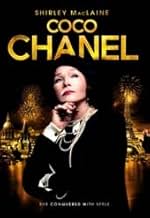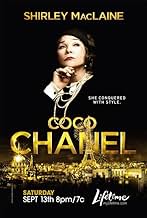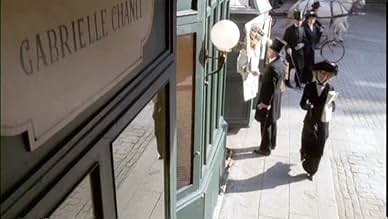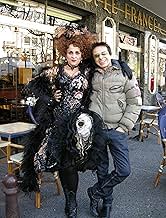IMDb RATING
6.8/10
3.9K
YOUR RATING
The life story of legendary fashion designer Coco Chanel.The life story of legendary fashion designer Coco Chanel.The life story of legendary fashion designer Coco Chanel.
- Nominated for 2 Primetime Emmys
- 2 wins & 8 nominations total
Valeria Cavalli
- Elisabeth Ducrot
- (as Valéria Cavalli)
Featured reviews
If you want to travel to another era and get a full introduction to the world of fashion, here's a great way to do it.
Even if it is a melodrama, it's so well made, with such obsession with detail, refinement, (as Chanel's works, by the way) that you can't but fall for Coco's challenges. And yet it doesn't shy away from her daily struggles. As a business student, I couldn't help noticing how often she was verging on bankruptcy, and how she came out of it with a mixture of audacity, being at the right places and yes, bedding rich gentlemen "above her station" as a Victorian would put it.
Music is fine, as is of course, wardrobe and photography. Being from Argentina, I found a happy curiosity that there are a couple of tangos and Argentina is mentioned twice, as a "land of hope". The first company mentioned on the titles that produced this film is called "Pampa", I suppose it must have something to do with it.
Barbora Bobulova is stunning as young Cocó. Probably more likable besides more beautiful than Audrieu Tatou, with which obviously one is drawn to compare it all the time. Both are fine, probably "Cocó avant Chanel" emphasizes the sad and grim aspects more, whereas this version, being longer, can indulge into more romance and yet show us, for instance, what happened to her beloved sister, something absent from the feature film. Also in this version we see the origin of the famous perfume N 5 and her famous "little black dress". Étienne Balsan and Boy Capel are totally different in both films. So much they almost look like if one of the two films got it all wrong. Étienne in particular is always amiable and respectful to Cocó here, whereas on "avant Chanel" Poelvoorde makes a perfect "good for nothing spoilt boy who never grew up". Boy is also given much more screen time and importance here. Emilienne d'Alencon is barely shown here, and the game of differences could go on and on. I suppose purists and people who really know the real story will love one story and hate the other. But for us newbies both are surprisingly enjoyable. I understand Mc Laine got all the prizes but in my opinion Boulova should have got them.
My "favourite little moment" is how the beautiful countess who lost everything becomes her shrewd "royal secretary", even suggesting her it'd be advantageous for Cocó for "everybody loves nobility. Specially in a republic". I suppose it's a worthy lesson on how money matters are fleeting indeed. I could only wonder, if this is a TV series, what would they have made were they given the ample resources of a feature film...
Even if it is a melodrama, it's so well made, with such obsession with detail, refinement, (as Chanel's works, by the way) that you can't but fall for Coco's challenges. And yet it doesn't shy away from her daily struggles. As a business student, I couldn't help noticing how often she was verging on bankruptcy, and how she came out of it with a mixture of audacity, being at the right places and yes, bedding rich gentlemen "above her station" as a Victorian would put it.
Music is fine, as is of course, wardrobe and photography. Being from Argentina, I found a happy curiosity that there are a couple of tangos and Argentina is mentioned twice, as a "land of hope". The first company mentioned on the titles that produced this film is called "Pampa", I suppose it must have something to do with it.
Barbora Bobulova is stunning as young Cocó. Probably more likable besides more beautiful than Audrieu Tatou, with which obviously one is drawn to compare it all the time. Both are fine, probably "Cocó avant Chanel" emphasizes the sad and grim aspects more, whereas this version, being longer, can indulge into more romance and yet show us, for instance, what happened to her beloved sister, something absent from the feature film. Also in this version we see the origin of the famous perfume N 5 and her famous "little black dress". Étienne Balsan and Boy Capel are totally different in both films. So much they almost look like if one of the two films got it all wrong. Étienne in particular is always amiable and respectful to Cocó here, whereas on "avant Chanel" Poelvoorde makes a perfect "good for nothing spoilt boy who never grew up". Boy is also given much more screen time and importance here. Emilienne d'Alencon is barely shown here, and the game of differences could go on and on. I suppose purists and people who really know the real story will love one story and hate the other. But for us newbies both are surprisingly enjoyable. I understand Mc Laine got all the prizes but in my opinion Boulova should have got them.
My "favourite little moment" is how the beautiful countess who lost everything becomes her shrewd "royal secretary", even suggesting her it'd be advantageous for Cocó for "everybody loves nobility. Specially in a republic". I suppose it's a worthy lesson on how money matters are fleeting indeed. I could only wonder, if this is a TV series, what would they have made were they given the ample resources of a feature film...
A biographic film basically loyal to the true history of the pioneering French fashion designer who created the word " Haute Couture" and spread the spiritual Chanel Numero 5 to the whole world is bound to be arresting to movie lovers no matter they are fond of pursuing vogue in beau monde. And the truth is that it's inspiring and engaging. For one thing, Coco Chanel gave women a sense of freedom; gave them back their bodies that were drenched in sweat due to fashion's finery, lace, corsets, underclothes and padding. For another, she insists on woman's independence which may be achieved via true career. Also the two actresses gave the excellent rendition of this legendary woman.
COCO CHANEL is a well-made film whose few flaws unfortunately detract from the enjoyment of what seems to be a rather firm biography of one of the great inventive minds of the 20th century. Though all publicity (and nominations for awards) focused on Shirley MacLaine who appears only periodically and for very brief amounts of time, the starts of the cast are a number of European actors, some strong, others, only medium strong. And while the real contribution Coco Chanel made to the world was her instatement of the equality of women, changing the manner in which they dressed (read fashionable) from corseted and plumaged mannequins to comfortably mobile and real personas, the writers of this version her life (Carla Giulia Casalini and James Carrington) elected to stress the women whose ability to adjust to being repeatedly deserted/used by men and turn this movie into a romance decorated by fashion. And even that idea, valid though it may be, is fairly well buried by a musical score that is so loud as to cover the dialogue - and the dialogue is in some nearly indecipherable language, a mixture of accents and lack of projection on the part of the actors who play more to the sets and costumes than to the audience.
Christian Duguay directs, electing to begin his story with the unhappy childhood of Gabrielle/Coco and Adrienne Chanel, orphans laced in a Catholic sweatshop to make clothes. These episodes of childhood to old age are well transitioned by a black and white, old movie film transfer that does add to the feeling of history. The girls grow into young women, Coco (Barbora Bobulova) goes to live with Etienne Balsan (Sagamore Stévenin), falls in love, faces the fact that her time with Etienne will be transitory, moves on to Paris where she struggles to make a living making hats until Boy Capel (Olivier Sitruk) becomes her benefactor and lover. But Boy leaves for the Front as a soldier for the French army, leaving Coco in Deauville to set up shop with the aid of her sister Adrienne (Valentina Lodovin). The back and forth aspects of the story show Coco in the 1950s (as Shirley MacLaine) making her comeback with the aid of her faithful manager Marc Bouchier (Malcolm MacDowell) and the film ends in a standing ovation for the woman who not only survived but who changed the world of fashion and feminism forever.
There are many other characters in the film who play important parts but they all look alike and have such heavy accents that keeping track of them is almost impossible. No subtitles are supplied: subtitles would enhance this film immeasurably! Fabrizio Lucci does wonders with the cinematic adaptation of the times frames of the piece, but composer Andrea Guerra (in a slushy replay of Tchaikovsky symphony themes) buries the lines of the actors and nearly destroys what is in essence a very good film.
Grady Harp
Christian Duguay directs, electing to begin his story with the unhappy childhood of Gabrielle/Coco and Adrienne Chanel, orphans laced in a Catholic sweatshop to make clothes. These episodes of childhood to old age are well transitioned by a black and white, old movie film transfer that does add to the feeling of history. The girls grow into young women, Coco (Barbora Bobulova) goes to live with Etienne Balsan (Sagamore Stévenin), falls in love, faces the fact that her time with Etienne will be transitory, moves on to Paris where she struggles to make a living making hats until Boy Capel (Olivier Sitruk) becomes her benefactor and lover. But Boy leaves for the Front as a soldier for the French army, leaving Coco in Deauville to set up shop with the aid of her sister Adrienne (Valentina Lodovin). The back and forth aspects of the story show Coco in the 1950s (as Shirley MacLaine) making her comeback with the aid of her faithful manager Marc Bouchier (Malcolm MacDowell) and the film ends in a standing ovation for the woman who not only survived but who changed the world of fashion and feminism forever.
There are many other characters in the film who play important parts but they all look alike and have such heavy accents that keeping track of them is almost impossible. No subtitles are supplied: subtitles would enhance this film immeasurably! Fabrizio Lucci does wonders with the cinematic adaptation of the times frames of the piece, but composer Andrea Guerra (in a slushy replay of Tchaikovsky symphony themes) buries the lines of the actors and nearly destroys what is in essence a very good film.
Grady Harp
Yeah, I agree with the other review. Gabrielle "Coco" Chanel was a Nazi spy and an opportunist.
I was enjoying the first half of the movie, but it started to drag by hour 2 with still some time on the clock...but it was a made-for-TV movie, so...
The younger Chanel was great, but Shirley MacClaine was a horrible choice for the older Coco. She may be a great actress but cannot pull off being a Frenchwoman! I cringed whenever she opened her mouth.
Finally, after the movie I did some research about the real Coco and the movie totally glossed over her antisemitism, homophobia, and pro-Nazism. It is hard for me to think of her as icon after learning that. Of course, the irony is that Chanel is now headed by two Jewish men whom she previously derided.
The younger Chanel was great, but Shirley MacClaine was a horrible choice for the older Coco. She may be a great actress but cannot pull off being a Frenchwoman! I cringed whenever she opened her mouth.
Finally, after the movie I did some research about the real Coco and the movie totally glossed over her antisemitism, homophobia, and pro-Nazism. It is hard for me to think of her as icon after learning that. Of course, the irony is that Chanel is now headed by two Jewish men whom she previously derided.
Did you know
- TriviaDaria Baykalova's debut.
- GoofsIn Deauville, the newspaper headline announcing the outbreak of the war incorrectly states, "Archduke Francis Joseph" had been assassinated in Sarajevo. Francis (Franz) Joseph was the reigning Austrian emperor and was most certainly not assassinated. His nephew and heir to the empire, Francis (Franz) Ferdinand was assassinated.
- ConnectionsFeatured in 15th Annual Screen Actors Guild Awards (2009)
- Who is Coco Chanel?
- How did Chanel get the nickname 'Coco'?
- How accurately does the movie describe Coco Chanel's life?
Details
Contribute to this page
Suggest an edit or add missing content

































